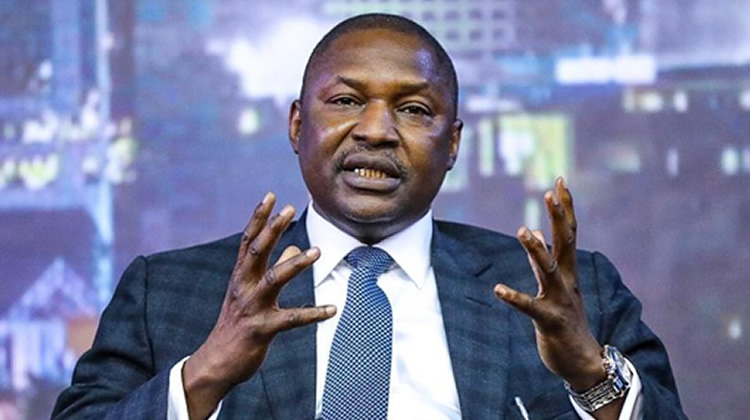
The Attorney-General of the Federation and Minister of Justice, Abubakar Malami, has denied blaming the judiciary for delays in the trial of corruption cases in the country.
According to him, the present regime accorded respect to the democratic provisions of the doctrine of separation of powers.
Malami had, in a TV chat on Monday, said the judiciary was responsible for delays in dispensation of justice in the country, especially in trials of corruption cases.
But in his reaction, Chief Justice of Nigeria, Justice Tanko Muhammad, in a statement issued by his Special Assistant (Media), Yusuf Ahurakah Isah, said the judiciary was neither in charge of the investigation nor the political and economic conditions that facilitate speedy disposal of corruption cases.
The CJN accused the Federal Government’s prosecution sector of filing more charges than it could prove or provide witnesses to prove, ostensibly at times for the prosecution to even fail.
According to him, the allegation by Malami was like giving a dog a bad name in order to hang it.
But Malami in a statement issued on Wednesday night by his Special Assistant (Media and Public Relations), Umar Gwandu, said that his comment was construed to evoke an unintended and non-existing inferences “which some mischief makers projected him as blaming the judiciary.”
According to him, the Federal Government recognised the sanctity of the provisions of Sections 4, 5 and 6 of the 1999 Constitution of the Federal Republic of Nigeria that delineate the roles and responsibilities of the executives, legislature and Judiciary.
He said it was on that note that the Federal Government supported the review of Section 121(3) of the Constitution of the Federal Republic of Nigeria to accommodate the provisions for financial autonomy of the state legislature and judiciary.
Malami explained that the Federal Government also came up with the Executive Order 10 to enforce the provision of autonomy of State Legislature and Judiciary.
The AGF stressed that it was on record that the present administration has a record of non-interference with or meddling into the affairs of the legislature and judiciary.
“It was within the context of this quality and feature of non-interference by the Buhari-led Federal government and for the avoidance of sub-judice that the Minister responded that high-profile cases were presented by the Federal Government for prosecution and the government came out with initiatives in its efforts to support speedy determination of justice.
“It was an innocent statement aimed at showing an re-enactment of a tripartite division of powers and responsibilities among the Executive, Legislature and Judiciary,” he said.
Malami said this position was consistent with the decision of the Court of Appeal in Hon. Abdullahi Maccido Ahmad v. Sokoto State House of Assembly & Anor, (2002) 44 WRN 52 where the Court Per Salami JCA held inter alia that;
“The doctrine of separation of powers has three implications: One is that, the same person should not be part of more than one of the arms or division of government;
“Secondly, one branch should not dominate or control another arm. This is particularly important in the relationship between (the) executive and the courts;
“That one branch should not attempt to exercise the function of the other.”
The Minister said in view of the crucial role of the judiciary as an essential element of democratic system, the federal government gives attention to the budgetary provisions of the Judiciary in addition to welfare-packages meant to enhance their operations.
Copyright PUNCH.
All rights reserved. This material, and other digital content on this website, may not be reproduced, published, broadcast, rewritten or redistributed in whole or in part without prior express written permission from PUNCH.
Contact: [email protected]





